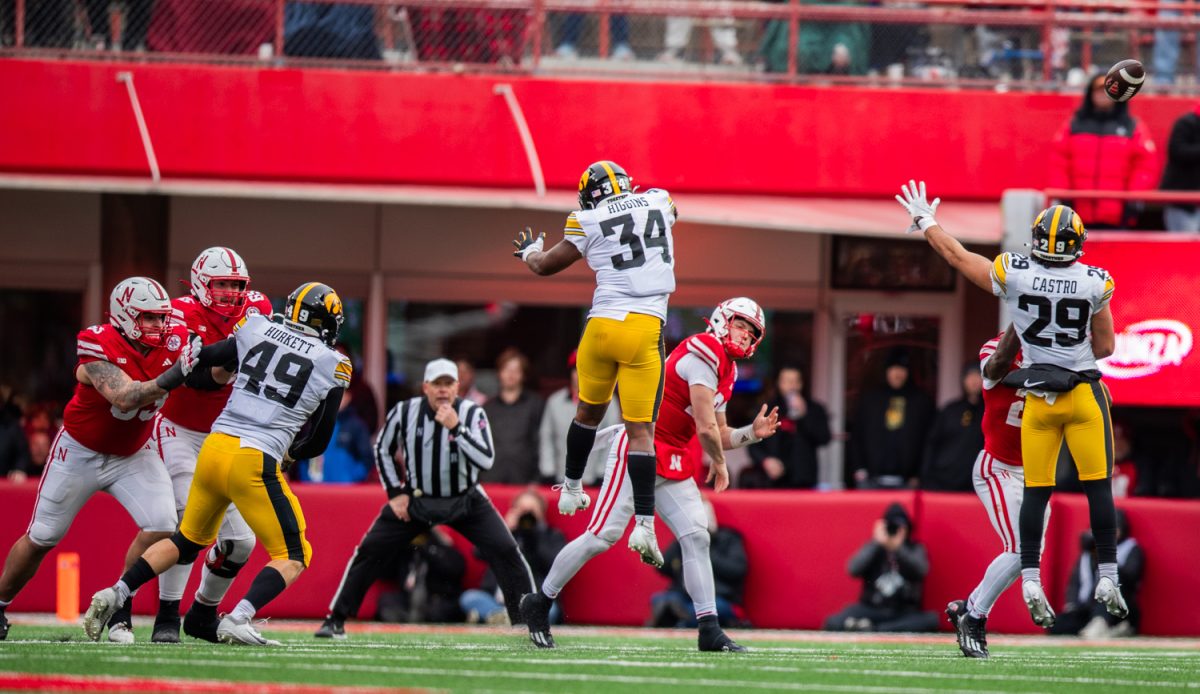1. Opening up the playbook
Iowa football hasn’t been known for offensive creativity in recent years, especially this season. Outside of a couple shovel passes and a few end-arounds, offensive coordinator Brian Ferentz has stuck to a conservative approach, opting to keep the ball on the ground 426 times this season compared to 291 passing attempts. And in those throws, the average yardage is just over five. The postseason, however, is where the Hawkeyes tend to innovate. Look no further than in the 2021 Big Ten title game, where then-Iowa running back Gavin Williams attempted a pass to former fullback Monte Pottebaum, who was wide open in the end zone. Williams’ toss was slightly overthrown, and that play ended up being perhaps the closest shot Iowa had at putting a touchdown on the board. Yet just because that play was unsuccessful doesn’t mean the Hawkeyes won’t try some trickery again this time around.
Iowa head coach Kirk Ferentz said his squad “has to make everything count” on Saturday, and that means taking advantage of every chance at scoring, even if that involves some risks. Don’t be surprised to see a designed lateral, non-quarterback pass, or even a fake punt in Indianapolis.
2. Time of possession
Iowa left tackle Mason Richman said during media availability on Monday that one of the team’s ‘ABCs’ of football is to possess the ball. Such a pillar will be fundamental in giving Iowa a chance to win this game. The last time the Hawkeyes played a ranked opponent was back in September against Penn State, where then-No. 7 Nittany Lions held onto the ball for more than 45 minutes compared to the Hawkeyes’ 14. Such a discrepancy forced Iowa’s defense to be on the field for too long, especially in the second half, where Penn State turned a 10-0 lead at the break into a 31-0 blowout by the final whistle. And while defensive coordinator Phil Parker’s unit is certainly well-conditioned, not even pro players can handle being on the field for 75 percent of the game.
In order to avoid having such a lopsided result happen again, Iowa needs to do another one of Richman’s aforementioned principles: advance the ball. Even if the drive doesn’t result in any points, the Hawkeyes can’t have repeated three-and-outs like they did to open the second half last week. Sustaining drives to at least 10 plays allows the defense to take the rest it needs to be at its best. Similarly, the offense can’t rely on simply getting the ball back, as the Wolverines have lost two fumbles all season.
3. Beating Michigan’s O-Line
A critical piece to Michigan’s offense is its rushing attack, led by lead back Blake Corum. Racking up 976 yards and a nation-best 22 touchdowns on the ground, the senior will most likely head off to the NFL this spring as a third-round draft pick. Yet when asked on Monday about stopping the run, Iowa defenders Jay Higgins and Joe Evans both lauded the Wolverines’ offensive line as the more immediate and pressing challenge.
“I think [Michigan’s O-line] does a good job of moving defensive lineman out of their gaps,” Higgins said on Monday. “Obviously, they have really talented running backs who are good at making things happen and reading and reacting off their offensive line.”
Having allowed just 14 sacks all season, the Wolverine front five has been stout, but took a hit last week when starting right guard Zak Zinter went down with a broken tibia and fibula. Zinter was a consensus All-Big Ten first-team selection in 2022. How the Hawkeyes exploit his absence will be key at containing the run game.
4. Kicking accuracy
I know I said the same thing two weeks ago ahead of Iowa’s matchup against Illinois, but unfortunately for the Hawkeyes, kicking accuracy has become even more of a glaring issue over the past two games. Kicker Drew Stevens missed a field goal and point-after attempt against the Illini, and last week against Nebraska, struggled mightily. Having two field goals blocked and two kickoffs sailed out of bounds, Stevens remained on the bench at the end of the game, when backup Marshall Meeder nailed the game-winning field goal.
Iowa head coach Kirk Ferentz made the right decision by opting with Meeder, and that’s not just in hindsight. Stevens was most likely in his head at that point, and it’s not like kickers can get themselves right midway through the game like a quarterback can. However, given his track record this season, Stevens should still start on Saturday, and the kicker is listed at No. 1 on the depth chart this week. If there’s one thing that can be guaranteed for Saturday, it’s that Iowa will not crush Michigan. If the Hawkeyes do prevail, it’s bound to be by three points or less, meaning that every kick can decide the difference. How Stevens bounces back against the Wolverines, or how quickly he is replaced if he struggles, will be a point of interest in Indianapolis.
5. Red zone battles
While the Iowa and Michigan offenses are miles apart in terms of yardage and points, the two schools both rank top-10 in the nation with regard to red zone defense. Ranking at No. 3 and No. 6, respectively, the Hawkeyes and Wolverines have each let up less than 20 red zone scores to their opponents this season.
Given such success, red zone scores won’t come easy on Saturday, and in a game where Iowa can’t afford to settle for field goals, breaking through the Michigan front will be critical. Yet for an Iowa red zone that ranks 79th in the nation, doing so will be easier said than done. If Brian Ferentz were to feature any unique plays, inside the 20 would be the ideal area.



